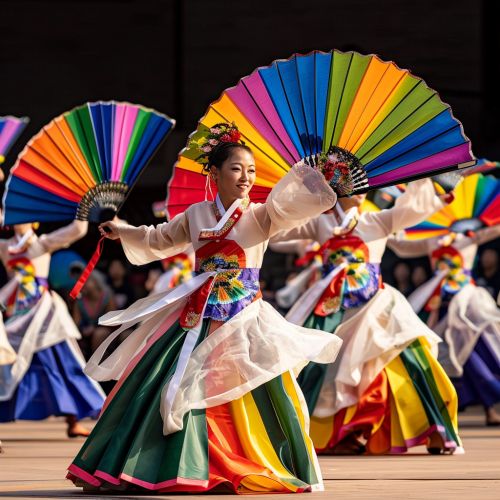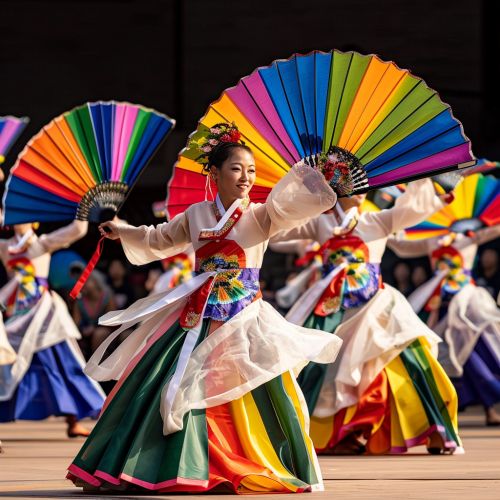South Korean Culture
Introduction
South Korean culture, also known as K-culture, encompasses the customs, traditions, and social behaviors of the people of South Korea. It is a dynamic blend of ancient traditions and modern influences, shaped by historical events, geographical factors, and interactions with other cultures. This article delves into various aspects of South Korean culture, providing a comprehensive and detailed exploration of its many facets.
Historical Background
South Korea's culture has been profoundly influenced by its historical context. The Three Kingdoms period (57 BC – 668 AD) laid the foundation for many cultural practices. The Joseon Dynasty (1392–1897) further shaped the cultural landscape with its emphasis on Confucianism, which continues to influence Korean society today. The 20th century brought rapid modernization and Western influences, particularly after the Korean War (1950-1953).
Language and Literature
The Korean language, Hangul, is a unique script created in the 15th century by King Sejong the Great. Hangul's scientific design makes it one of the most efficient writing systems in the world. South Korean literature has evolved from classical works, such as the Samguk Yusa and Samguk Sagi, to contemporary novels and poetry that address modern themes and issues.
Religion and Philosophy
Religion in South Korea is diverse, with a significant presence of Buddhism, Confucianism, and Christianity. Confucianism, in particular, has deeply influenced Korean social norms, values, and family structures. The concept of filial piety and respect for elders are central tenets of Korean philosophy.
Traditional Arts and Crafts
South Korea boasts a rich tradition of arts and crafts, including Hanbok (traditional clothing), Hanji (traditional paper), and Celadon pottery. These crafts are not only artistic expressions but also hold cultural and historical significance. The intricate designs and techniques have been passed down through generations, preserving the cultural heritage.
Performing Arts
Music
Traditional Korean music, or Gugak, includes various forms such as Pansori (a form of musical storytelling) and Samulnori (percussion music). Modern Korean music, particularly K-pop, has gained international fame, contributing to the global spread of Korean culture.
Dance
Traditional Korean dance, such as Buchaechum (fan dance) and Talchum (mask dance), often depict historical and mythological themes. These dances are characterized by graceful movements and elaborate costumes.


Cuisine
South Korean cuisine, or Hansik, is known for its diverse flavors and health benefits. Staples include Kimchi, a fermented vegetable dish, and Bulgogi, marinated beef. The cuisine emphasizes balance and harmony, often incorporating a variety of side dishes, or Banchan, in each meal.
Modern Culture
Cinema and Television
South Korean cinema and television have gained international acclaim, with films like Parasite winning prestigious awards. K-dramas are popular worldwide, known for their compelling storytelling and high production values.
Fashion
South Korean fashion is a blend of traditional and contemporary styles. Seoul Fashion Week is a major event that showcases the latest trends and designs, reflecting the country's influence in the global fashion industry.
Technology and Innovation
South Korea is a global leader in technology and innovation, home to major companies like Samsung and LG. The country has a high internet penetration rate and is at the forefront of advancements in fields such as robotics and biotechnology.
Social Structure and Family
The traditional Korean family structure is patriarchal, with a strong emphasis on hierarchy and respect for elders. However, modern South Korean society is experiencing changes, with increasing gender equality and evolving family dynamics.
Festivals and Holidays
South Korea celebrates various traditional and modern festivals. Chuseok (harvest festival) and Seollal (Lunar New Year) are major holidays that involve family gatherings, traditional games, and rituals. These festivals reflect the country's agricultural heritage and cultural values.
Education
Education is highly valued in South Korea, with a rigorous system that emphasizes academic achievement. The College Scholastic Ability Test (CSAT) is a crucial exam for high school students, determining their future educational and career opportunities. The country's focus on education has contributed to its rapid economic development.
Sports
South Korea has a strong sports culture, excelling in disciplines such as taekwondo, archery, and short track speed skating. The country has hosted major international events, including the 1988 Seoul Olympics and the 2018 Pyeongchang Winter Olympics, showcasing its athletic prowess.
See Also
- Three Kingdoms of Korea
- Joseon Dynasty
- Hangul
- Buddhism
- Confucianism
- Christianity
- Filial piety
- Hanbok
- Hanji
- Celadon
- Gugak
- Pansori
- Samulnori
- Buchaechum
- Talchum
- Kimchi
- Bulgogi
- Banchan
- Parasite
- K-dramas
- Seoul Fashion Week
- Samsung
- LG
- Chuseok
- Seollal
- College Scholastic Ability Test
- Taekwondo
- Archery
- Short track speed skating
- 1988 Seoul Olympics
- 2018 Pyeongchang Winter Olympics
References
[References would be listed here if available]
